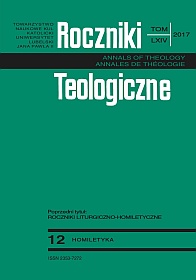500 Jears Reformation. The Doctrine of Justification Today. Part 1: Individual Aspects
Abstract
The doctrine of justification is the core element of the Reformation in the 16. century. The article hints to the origin of this doctrine and gives an interpretation of individual aspects for our time. Luther articulated own for the medieval times typical fears, which were connected to the power of the Church. He put against it the grace of God, who justifies the sinner out of faith without works of the law. The doctrine of justification nowadays does not split Christian churches any longer. Secular thinking, die huge variety of religions and immense social injustices seems to contradict a meaningful understanding of God and the doctrine of justification as well. But this doctrine is obviously related to and based on fundamental aspects of human life. And the Christian faith offers a world-view, which tolerates the ambivalences and encourages to life. Forgiveness and acception between human beings and of a person to herself or himself are experiences, which are integrated in the Christian tradition of the doctrine of justification. Its individualistic restriction and abstract interpretation have been heavily criticised. If the social aspects are also unconsidered, the justification can strengthen human beings and enhance solidarity.
References
Bieler, Andrea und Gutmann, Hans-Martin. Rechtfertigung der „Überflüssigen.” Gütersloh: Gütersloher Verlagshaus, 2008.
D. Martin Luthers Werke, Kritische Gesamtausgabe 1. Band. Hrsg. Joachim Karl Friedrich Knaake u.a. Weimar: H. Böhlau, 1883.
Dostojewski, Fjodor. Die Brüder Karamasoff. München−Klagenfurt: Neuer Kaiser Verlag, Hans Kaiser, 1978.
Evangelische Landeskirche in Baden. „Rechtfertigung allein aus Glauben.” 26 April, 2017. http://ekiba.de/html/content/rechtfertigung_allein_aus_glauben.html?&.
Georgi, Dieter. „Auf dem Weg zu einer urbanen Theologie.” In Religion und Urbanität, Hrsg. Carsten Burfeind u.a. 137-154. Münster u.a.: Waxmann Verlag GmbH, 2009.
Der Heidelberger Katechismus hrsg. von der Evangelisch-reformierten Kirche. 2. Aufl. Neukirchen-Vluyn: Neukirchener Verlag, 2001.
Franziskus. „Interview.” April 26, 2017. https://www.domradio.de/themen/papst-franziskus/2017-03-08/papst-franziskus-spricht-im-interview-ueber-priestermangel-und-einen-deutschlandbesuch.
Helle, Horst Jürgen. Soziologie und Symbol. Köln/Opladen: Westdeutscher Verlag, 1969.
Käsemann, Ernst. „Gottesgerechtigkeit bei Paulus.” Zeitschrift für Theologie und Kirche 58(1961): 367-378.
Leppin, Volker. „ Gerechtigkeit̕: Entwicklungslinien in der Kirchengeschichte.” In Gerechtigkeit. Hrsg. Markus Witte, 99-123. Tübingen: Mohr Siebeck, 2012.
Luther, Martin. „Diverse Texte – Luther, Martin − Wie Luther die Gnade wieder entdeckte.” April 26, 2017. http://www.efg-hohenstaufenstr.de.
Luther, Martin. Vorrede zum ersten Band der Wittenberger Ausgabe der lateinischen Schriften Luthers, zitiert nach Gräb-Schmidt, Elisabeth. „Gerechtigkeit systematisch-theologisch.” In Gerechtigkeit. Hrsg. Markus Witte, 125-155. Tübingen: Mohr Siebeck, 2012.
Mauss, Marcel. Die Gabe, 10. Aufl. Frankfurt am Main: Suhrkamp Taschenbuch Verlag, 2013. Französisches Original, Essai sur le don. Paris: Presses Universitaires de France, 1950.
„Rechtfertigung und Freiheit.” Kirchenamt der Evangelischen Kirche in Deutschland (Hrsg.). 4. Aufl. Gütersloh: Gütersloher Verlagshaus, 2015.
Schleiermacher, Fridrich. Über die Religion. Berlin: Unger Verlag, 1799, zitiert aus der Reclamausgabe. Stuttgart, Ditzingen: Philipp Reclam jun. GmbH & Co. KG, 2010.
Tamez, Elsa, Contra toda condena. Costa Rica: Editorial DEI San José, 1991, deutsch: Gegen die Verurteilung zum Tod. Luzern: Genossenschaft Edition Exodus, 1998.
Tillich, Paul. In der Tiefe ist Wahrheit, Religiöse Reden 1. Folge, 5. Aufl. Stuttgart: Evangelisches Verlagswerk, 1952.
Tillich, Paul. Systematische Theologie. Bd. III. Stuttgart: Evangelisches Verlagswerk, 1966.
Tillich, Paul. Wesen und Wandel des Glaubens. West Berlin: Ullstein, 1966.
Copyright (c) 2017 Roczniki Teologiczne

This work is licensed under a Creative Commons Attribution-NonCommercial-NoDerivatives 4.0 International License.





